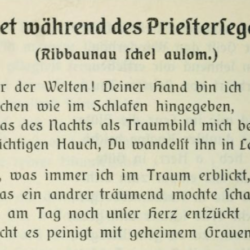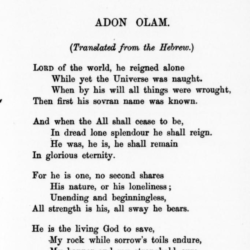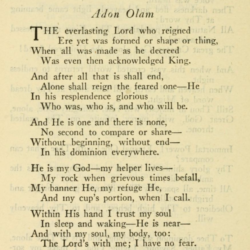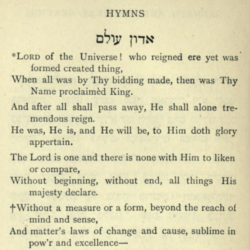| Source (Hebrew) | Paraliturgical adaptation (German) | Translation of the German (English) |
|---|---|---|
אֲדוֹן עוֹלָם אֲשֶׁר מָלַךְ בְּטֶֽרֶם כׇּל־יְצִיר נִבְרָא׃ |
Der Herr des Weltalls tronte schon, Bevor aus seiner Schöpferhand Ein Nichts, geformt aus Erdenton, Den Weg ins Tal des Lebens fand. |
The Lord of the Cosmos was already enthroned, When, from his creator hand A nothing, formed from earthen clay, Found its way into the Vale of Life. |
לְעֵת נַֽעֲשָׂה כְּחֶפְצוֹ כֹּל אֲזַי מֶֽלֶךְ שְׁמוֹ נִקְרָא׃ |
Eh noch in Lüften und im Meer Er Fisch und Vogel atmen hieß, War schon allein der Herrscher er, Den selbst des Chaos Toben pries. |
While in the air and in the sea He bade fish and bird to breathe, He alone was the ruler, Whom even the Raging Chaos praised. |
וְאַֽחֲרֵי כִּכְלּוֹת הַכֹּל לְבַדּוֹ יִמְלֹךְ נוֹרָא׃ וְהוּא הָיָה וְהוּא הֹוֶה וְהוּא יִֽהְיֶה בְּתִפְאֲרָה׃ |
Und ob dies All in nichts zerfällt, Sein Reich wird dennoch fortbestehn, Und über der zerstörten Welt Wird seines Geistes Hauch noch wehn; |
And if all this disintegrates into nothing, His kingdom will still endure, And over the ruined world His spirit’s breath will still blow; |
וְהוּא אֶחָד וְאֵין שֵׁנִי לְהַמְשִׁיל לוֹ לְהַחְבִּירָה׃ |
Denn er ist einzig und allein, Kein andrer ist ihm zu vergleichen, Er wird in Ewigkeiten sein, Die selbst im Traum nicht zu erreichen. |
For he is one and alone, No other is comparable to him, His existence is in Eternity, Unreachable even through Dream. |
בְּלִי רֵאשִׁית בְּלִי תַּכְלִית וְלוֹ הָעֹז וְהַמִּשְׂרָה׃ |
Sein ist die Herrschaft und die Macht, Er ist ohn’ Anfang und ohn’ Ende, Drum was der Tag an Leid gebracht, Leg’ ich getrost in seine Hände. |
His is the dominion and the power, He is without beginning and without end, So whatever sorrow the day may bring, I confidently place in his hands. |
וְהוּא אֵלִי וְחַי גּֽוֹאֲלִי וְצוּר חֶבְלִי בְּיוֹם צָרָה׃ וְהוּא נִסִּי וּמָנוֹס לִי מְנָת כּוֹסִי בְּיוֹם אֶקְרָא׃ |
Denn er, der mein Erlöser, lebt, Er ist der Kelch, der mir beschieden, Die Zuflucht, die mein Herz erstrebt, In sturm und Not mein ew’ger Frieden |
For he who is my Redeemer, lives, He is the cup that is mine, The refuge my heart seeks, In storm and trouble my everlasting peace |
בְּיָדוֹ אַפְקִיד רוּחִי בְּעֵת אִישַׁן וְאָעִֽירָה׃ |
Im streit des Tags, im Ruh’n der Nacht Befehl’ ich mich in seine Hände Und traue, daß er für mich wacht Und alles Leid zum Heile wende. |
In the strife of the day, in the quiet of the night I put myself in his hands And trust that he will watch over me And turn all sorrow to salvation. |
וְעִם רוּחִי גְּוִיָּתִי אֲדֹנָי לִי וְלֹא אִירָא׃ |
Und ob das Dunkel noch so dicht, Mein Herz kann zweifeln nicht und klagen, Und selbst im letzten Kampf es spricht: Gott ist mit mir, wie sollt’ ich zagen! |
No matter how thick the darkness, My heart cannot doubt and lament, And even in the last struggle it speaks: “God is with me, why should I hesitate‽!” |
The paraliturgical adaptation and expansion of “Adaun Aulom” by Lise Tarlau can be found in Rabbi Max Grunwald’s anthology of Jewish women’s prayer, Beruria: Gebet- und Andachtsbuch für jüdische Frauen und Mädchen (1907), pages 93-94. I have set the stanzas or verses from Adon Olam in their original Hebrew side-by-side with Lise Tarlau’s adapted text (according to the arrangement that seems closest to me) so that their proximity may illuminate her inspiration.
The transcription of the German provided machine-readable text for machine translations by DeepL, which we then edited for accuracy and clarity. We welcome any/all corrections, improvements, and additional transcriptions and translations of this work’s contents. –Aharon Varady
Source(s)


“אֲדוֹן עוֹלָם | Adaun Aulom, a paraliturgical adaptation of Adon Olam by Lise Tarlau (1907)” is shared through the Open Siddur Project with a Creative Commons Attribution-ShareAlike 4.0 International copyleft license.










Leave a Reply